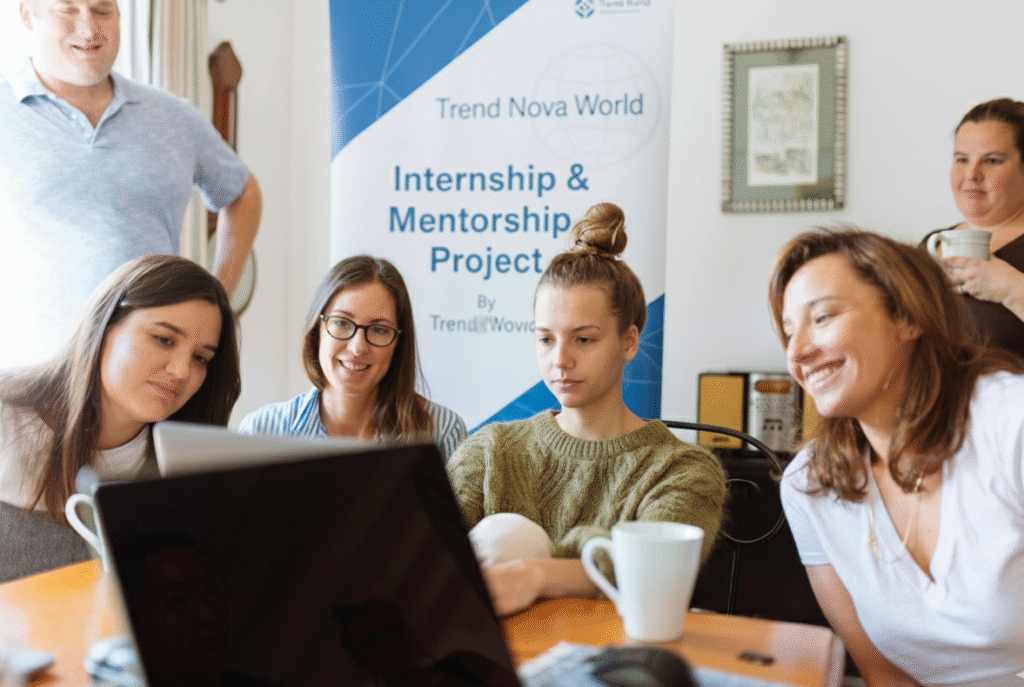Tech Mentorship empowers underserved students for tech careers with skills & networks. Partner with Trend Nova for SDG impact!

Project Overview
Project Name: Tech Mentorship, Guide Students in Technology Careers
Division: Tech & Education Advisory Division, Trend Nova World Development Sector
Objective: To empower students aged 15–25 from underserved communities with mentorship, skills, and networks to pursue careers in technology, aligning with UN Sustainable Development Goals (SDGs) 4 (Quality Education), 8 (Decent Work and Economic Growth), and 10 (Reduced Inequalities).
Target Audience: Students in emerging economies, particularly from marginalized groups such as low-income communities, women, and ethnic minorities, with an interest in technology fields like coding, data science, and cybersecurity.
Expected Impact: Mentor 1,000 students annually by 2027, achieving a 50% placement rate in tech-related jobs or further education and a 30% income increase within one year.
Key Partners: Tech companies (e.g., Microsoft, Google), educational institutions, local cooperatives, and international organizations (e.g., UNESCO, International Labour Organization).
Funding Goal: Mobilize $2 million through strategic partnerships and grants by 2027 to launch and scale the program.
Contact: contact@trendnovaworld.com
Project Rationale
The technology sector is a key driver of global economic growth, projected to contribute $15.7 trillion to the global economy by 2030, yet students from underserved communities often lack access to the mentorship and resources needed to enter this field. The International Labour Organization reports a 13.7% youth unemployment rate, with significant barriers for marginalized groups, particularly women, who represent only 26% of tech workers globally. The Tech Mentorship project, led by Trend Nova’s Tech & Education Advisory Division, addresses these gaps by providing personalized mentorship, skill-building opportunities, and career guidance to prepare students for technology careers. By fostering inclusion and innovation, the program supports SDG targets and drives economic empowerment, making it a compelling opportunity for partners and donors committed to transformative education.
This initiative leverages Trend Nova’s expertise in cross-sector collaboration and impact measurement to deliver scalable solutions. It aligns with global priorities, such as UNESCO’s focus on digital skills and the ILO’s decent work agenda, positioning it as a strategic investment for stakeholders aiming to bridge the digital divide and foster equitable growth.
Project Components
1. Student Assessment and Mentorship Matching
- Objective: Identify student aspirations and match them with suitable tech mentors.
- Activities:
- Conduct assessments using digital tools to evaluate interests, skills, and career goals in tech fields.
- Analyze tech industry trends to align mentorship with high-demand areas like software development, AI, and cybersecurity.
- Pair students with mentors from tech companies and cooperatives based on expertise and compatibility.
- Outcomes: Match 300 students with mentors in the 2026 pilot, with 80% alignment to career goals.
- Resources: Assessment platforms, industry analysts, mentor networks.
2. Tech Skill-Building and Mentorship Program
- Objective: Provide hands-on tech training and ongoing mentorship to build career readiness.
- Activities:
- Offer hybrid mentorship sessions (virtual and in-person) covering coding, data analysis, and tech project management.
- Provide access to online learning platforms like Coursera and Codecademy for industry-recognized certifications.
- Facilitate mentor-led workshops on soft skills, such as problem-solving and professional networking.
- Outcomes: 70% of students complete mentorship programs, with 65% reporting enhanced tech skills.
- Resources: E-learning platforms, tech mentors, workshop facilitators.
3. Career Networking and Placement Support
- Objective: Connect students to tech industry opportunities and further education.
- Activities:
- Organize virtual and in-person tech career fairs with companies like Microsoft and Google.
- Provide career coaching on resume building, interview preparation, and portfolio development.
- Facilitate internships and apprenticeships through partnerships with tech firms and educational institutions.
- Outcomes: Achieve a 50% placement rate in tech jobs or further education within six months.
- Resources: Career counselors, cooperative networks, event coordinators.
4. Impact Measurement and Follow-Up
- Objective: Track program outcomes to ensure transparency and continuous improvement.
- Activities:
- Implement global-standard monitoring and evaluation systems to track key performance indicators (e.g., mentorship completion, placement rates, income growth).
- Conduct follow-up surveys at 6 and 12 months to assess career progression and program impact.
- Produce detailed reports and dashboards for partners, highlighting measurable results.
- Outcomes: 30% average income increase for participants within one year.
- Resources: Monitoring and evaluation software, data analysts, reporting tools.
Implementation Plan
- Phase 1 (Q1–Q2 2026): Launch pilot in three countries (e.g., Nigeria, Pakistan, Brazil), mentoring 300 students. Mobilize $400,000 through cooperative partnerships and grants.
- Phase 2 (Q3 2026–Q2 2027): Expand to four additional countries, reaching 1,000 students annually. Secure $1.6 million via international grants and corporate contributions.
- Phase 3 (Q3 2027–2030): Scale to 4,000 students annually, integrating advanced tech like AI-driven mentorship tools. Mobilize $4 million for long-term sustainability.
- Monitoring & Evaluation: Track key performance indicators quarterly, including mentorship completion, placement metrics, and diversity outcomes. Share impact reports with partners annually.
Budget Overview
- Total Budget: $2 million (2026–2027)
- Student Assessment & Mentorship Matching: $300,000 (assessments, industry analysis)
- Tech Skill-Building & Mentorship: $800,000 (platforms, mentors, workshops)
- Career Networking & Placement Support: $600,000 (events, coaching, internships)
- Impact Measurement & Follow-Up: $200,000 (monitoring and evaluation systems, reporting)
- Administrative Costs: $100,000 (staff, logistics)
- ROI Projection: $4 economic value per $1 invested, based on participant earnings and economic contributions.
Funding and Partnership Strategy
Trend Nova’s Tech & Education Advisory Division is mobilizing resources through strategic cooperative partnerships and grants, leveraging our expertise in education and technology integration. Our approach includes:
- Grants: Engage with UNESCO, USAID, and the U.S. Department of Labor’s workforce development programs, aligning with their focus on digital skills and inclusion.
- Cooperative Networks: Partner with global cooperatives like the International Cooperative Alliance and local tech cooperatives for mentor recruitment and resource sharing.
- Corporate CSR: Collaborate with tech firms like Microsoft and Google, offering co-branding and talent pipeline opportunities.
- Philanthropic Foundations: Target foundations like the Mastercard Foundation, emphasizing digital inclusion and youth empowerment.
Success Metrics
- Short-Term (6 Months): 70% mentorship completion rate, 65% student satisfaction with skill gains.
- Medium-Term (1 Year): 50% placement rate in tech jobs or further education, 30% average income increase.
- Long-Term (3 Years): Mentor 1,000 students annually, generating $6 million in economic impact through earnings and innovation.
Partner Value Proposition
- Impact Alignment: Advances SDGs 4, 8, and 10 through cooperative-driven tech mentorship.
- Transparency: Real-time monitoring and evaluation dashboards and comprehensive impact reports.
- Scalability: Pilot-ready model with potential to mentor 4,000 students by 2030.
- Brand Visibility: Co-branding opportunities in reports, career fairs, and global forums.
- Leverage: Cooperative partnerships with UN agencies and tech firms to maximize contributions.
Challenges and Mitigation
- Challenge: Limited access to technology in underserved areas.
- Solution: Provide subsidized devices and leverage cooperative networks for digital access.
- Challenge: Matching mentors to diverse student needs.
- Solution: Use AI-driven matching tools and expand mentor pools through global partnerships.
- Challenge: Coordination across cooperative partners.
- Solution: Implement shared digital platforms for seamless collaboration.
Call to Action
The Tech Mentorship project empowers underserved students to thrive in technology careers, driving inclusion and innovation. Trend Nova’s Tech & Education Advisory Division invites cooperative partners and donors to join this mission. Contact us at contact@trendnovaworld.com to explore collaboration opportunities and shape a tech-driven future for youth.
Discover the Future. Explore Our World.
Trend Nova World: Uniting Innovation






